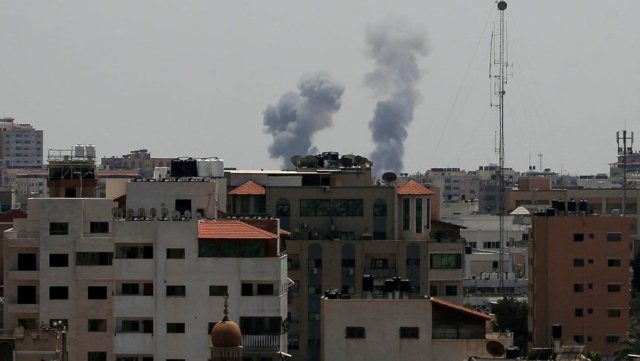


|
Israeli missiles strike Palestinian homes as part of a series of violent airstrikes on May 29, 2018. (Photo: Reuters) The land of Palestine, which was subject to an Israeli blockade,
is facing a major crisis. Meanwhile, the international community seems to be
deadlocked as it cannot pass any resolution related to the crisis.
Two rounds of voting at the United Nations Security Council
(UNSC) on resolutions issued by the United States and Kuwait failed. The UNSC
was unable to pass a draft resolution by the US to condemn Hamas for the
recent violence in Gaza, as well as a draft resolution issued by Kuwait that
criticised Israel using violence against civilians in Gaza and called for
urgent safeguarding measures against the Palestinians.
The US was the only country to vote in favour of the draft built
by it and the super power country also vetoed the Kuwaiti resolution. The US holds
the veto power of a permanent member under the UNSC to protect its Israeli
allies, despite the pressure of the international community to oppose the
recent military actions of the Jewish state against the Palestinians. This is
why the international community has not been able to agree on a more
appropriate response to the increasingly dangerous developments in Gaza, even
if Nickolay Mladenov, UN Special Coordinator for the Middle East Peace
Process, has warned that the territory is "on the brink” of war.
Violence along the Gaza and Israel borders has caused
unprecedented health crises. So far, at least 123 Palestinians have died and
around 13,000 have been injured by Israeli shelling in clashes triggered by
the Palestinian uprising last March.
The International Committee of the Red Cross has warned that the
large number of casualties has led to overcrowding at hospitals, pushing
Gaza’s severely degraded health system to the point of collapse. In the seven
weeks since the demonstrations and violence, the number of wounded was higher
than the number of casualties in the Israeli war in Gaza in August 2014.
Palestinians inspect an Islamic Jihad observation post after it
was targeted in an Israeli tank strike, in the southern Gaza Strip, May 27,
2018. (Photo: Reuters)
The current crisis has affected all aspects of life in Gaza.
Palestinians have asked the International Criminal Court to launch a
comprehensive investigation into allegations of human rights violations in
occupied Palestinian territories, while the Israeli side justified the use of
force against the protesters in order to protect the security barrier and
prevent the Palestinians from penetrating into its territory.
The international community has voiced opposition to any move
that could spark a flame of hatred among Palestinians. At the recent
consultation, Foreign Ministers of Egypt and Jordan and Secretary General of
the Palestine Liberation Organisation, Saeb Erekat, emphasised that East
Jerusalem is an inseparable part of the Palestinian territories, and at the
same time opposed Israeli actions against the unarmed Palestinians. Israel's
continuing hostility toward the Palestinians only served to push the Middle
East peace process into a stalemate.
During the tense situation, Israel’s recent announcement of its
plan to build nearly 2,000 settlement homes on the West Bank, as well as the
demolition of the Palestinian village of Khan al-Ahmar, is a move that
"adds fuel to fire," seriously damaging the prospect of a two-state
solution. The European Commission has asked the Israeli government to
reconsider the decision that is considered to heighten the tension between
the Israeli and the Palestinian sides.
UN officials have assessed that the situation in Gaza may
deteriorate if the international community cannot offer a solution to cool
down the tensions. Large rallies are expected to continue in June. French
Ambassador to the UN Francois Delattre has also warned that the Security
Council’s disagreement over the response to the Gaza crisis harms the UN.
This increasingly heavy silence is unacceptable, he said, adding that no one
in Gaza could endure another war.
The Gaza Strip needs the silence of gunfire, not the silence of
the human heart. Peace-loving people want the international community to
quickly come up with an effective solution to stop violence. Stakeholders
should also be restrained, as any "tit-for-tat" move can ignite
small flames of conflict into a large fire in this land.
|
Source: NDO